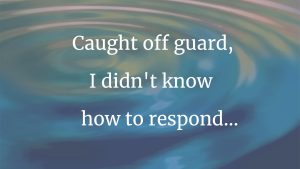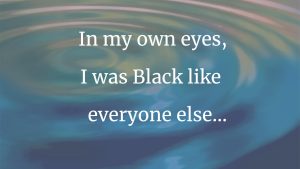Ray Bingham
One day in April, I took the assignment none of the other nurses wanted: Baby Michael. A hopeless case.
Born almost four months premature, weighing barely a pound, he was now all of six days old. His entire body wasn’t much longer than my open hand. As he lay motionless on a warming bed with the ventilator breathing for him, the night nurse gave me report: serious intestinal infection, bowel surgery, septic shock, multiple antibiotics, infusions to support his failing heart, transfusions to replace the serous drainage seeping from the surgical incision on his darkened, swollen belly.
“Take good care of him,” she finished. “He’s been through so much already.”
As experienced nurses, we both knew that a premature infant rarely survives so many medical complications.
Tiny and sick as he was, his parents Frank and Tonya loved him. Midmorning, they came to visit. They were a young African-American couple–he, tall and wiry; she, shorter, with thick, wavy dark hair. They both looked so weary.
With the attending physician, Dr. Moore, I joined them at Michael’s bedside. Trying to be compassionate but honest, we described the progress of Michael’s infection and his grave prognosis.
Still, when Tonya held his hand and whispered in his ear, Michael gripped her finger, and his yellowed eyes cracked open.
I remembered a line I’d read in T.S. Eliot’s The Waste Land–a line he borrowed from Shakespeare: “Those are pearls that were his eyes….”
Frank, carrying a small cooler, asked me where the milk freezer was. Together we went to deposit the labeled vials containing Tonya’s carefully expressed and frozen drops of yellow-tinged breast milk.
There, in the quiet, Frank said, “I don’t know if my wife can take it, seeing our baby this way. But should we stay?” I knew that this was his way of asking me how soon his son would die.
“While Michael’s alive, there’s always hope,” I replied. “But he’s small and weak. He’s been through a lot.”
We returned to Michael’s bedside.
Frank and Tonya sat together, holding each other and whispering softly to their son. After a short while, they said their goodbyes and left.
For the rest of the day, Michael made no response as I turned him, stroked his cheek or suctioned his breathing tube. I changed his diaper only out of a sense of ritual. It was dry; his bowels and kidneys had shut down.
Seven o’clock came. The night-shift nurses entered the unit.
“At least I won’t be the one taking Michael to the morgue,” I thought.
At that moment, his heart rate began to drift down. The monitor alarm rang. My fellow nurses rushed over with the emergency cart containing meds, tubes, needles and the defibrillator with its tiny neonatal electrode pads.
Another line from Eliot’s poem came to me: “I have heard the key turn in the door once and turn once only.”
It was time to turn the key and let Michael go.
“Don’t touch him,” I said.
Just then, Dr. Moore appeared. “What’s going on?”
“We talked about this on rounds this morning,” I answered. “We’re already doing everything we can. At this point, we’re just causing him more pain.”
“Ray, I sympathize, but we have no choice,” said Dr. Moore. “We have to do this.” Although Frank and Tonya had discussed the DNR (do not resuscitate) order, they hadn’t been able to bring themselves to sign it.
I looked at Michael. I had the sense that he’d departed long since–perhaps when his parents had left. He was already beyond our reach.
Reluctantly, I nodded and took my place by his side. The code proceeded–chest compressions, bag ventilation, messy blood draws for STAT lab work, hurried intravenous lines for more access, shocks from the defibrillator jolting his tiny torso.
Then at last it was over.
I looked down at the bloodied bedsheet, the red-spattered equipment, the tiny, bruised body.
Again Eliot’s words came to me: “April is the cruelest month…”
I wiped up the spilled blood, changed the spattered linens and took away the equipment.
Responding to our phone call, Frank and Tonya rushed in as I was bathing Michael’s swollen body. Dr. Moore took them to the conference room.
I finished the bath, dressed and wrapped the body, made the bed with clean linens and pulled the screens around it. At last, I went to join Michael’s parents.
I found them seated in the dim room, Dr. Moore leaning forward, Tonya sobbing on the couch as Frank held her.
“I’d like to see him,” Frank told me.
I walked him to the bed. Frank looked at his son, clean and swaddled, a blue knitted cap on his head, and asked me to take a last picture of Michael lying there peacefully, as if sleeping.
“I don’t think Tonya should see him,” Frank said. “It might hurt her too much.”
“Your wife is strong,” I answered. “She’ll need to work through her own grief.”
So I lifted Michael from the bed and carried him to the back. Tonya took him from me and held him, crying. Then she smiled, recounting the details of their son’s brief struggle with life. She thanked us.
“He felt your love,” I said. “The last thing I saw him do was to grip your finger and open his eyes.”
And again, I remembered the pearls that were his eyes.
About the author:
Ray Bingham lives in Gaithersburg, MD, with his wife, three kids, three cats and one dog. He worked as a neonatal nurse for more than ten years before turning his attention to science writing and editing. His essays and stories have appeared in a wide range of publications, including The Washington Post, Health Affairs, American Journal of Nursing and Journal of Nursing Jocularity. He is currently working toward a master’s degree in nursing education at George Mason University in Fairfax, VA. He is an avid, if not particularly fast, runner.
Story editor:
Diane Guernsey







